Good show on Talk of the
Nation
Monday: "Seeking Good News in
Africa".
First of all, I want to say that ToTN is one of my favorite NPR/PRI
shows (I also love The World and
Marketplace, and Terry Gross is
usually good on Fresh Air). Neil
Conan is probably the most patient and likable call-in show host in my
limited experience of talk radio.
The blurb for this program segment is:
The next G8 summit in July will focus on poverty in Africa along with
war, famine and drought. But some are calling for a broader view of
Africa, citing its many qualities that go beyond famine and tragedy. We
discuss how to balance the bad news with the good from a continent in
need.
It is nice to hear more than just the usual famine/jungle/war/safari
image of sub-Saharan Africa in mainstream media (with nude children as
the inexplicable universal extras). It was a good discussion, and I
highly recommend it. Some of my own reaction...
"Jean" from the Cote d'Ivoire called in to advocate decentralization of
power and local allocation of resources, which is precisely what we
need, but he also admitted the down-side to this as over-simplified
formula. Often encouragement of local policy leads to fractious forces
that cause tension and can lead all the way to Civil war. Most African
countries are unfortunate agglomerations of numerous rival ethnic
groups, and a heavy-handed federalism can be the only way to ensure
unity. On the other hand such centralization is a huge obstacle to
developmental progress. Whoever can figure out a practical solution to
this dilemma (besides the slow, assimilating force of time and
demographics, which is what did the trick in old Europe) will have
earned the Nobel Prize for peace as well as economics.
"James" from Ft. Lauderdale had an all-too-credible tale of attempting
to do business in Nigeria, and being defrauded time and time again, and
permanently swearing off any sort of commerce anywhere in the African
continent (bit of an overreaction, perhaps, but can you really blame
him?). This is the simple reality check. We have a long way to go
(especially in Nigeria) in dealing with fraud and lawlessness. Right
now there is no substitute for local (and wily) guidance if you want to
do business in much of the continent.
The last caller was "Kehinde" (I think: he never himself said his name,
so I had to go by Neil Conan's suspect pronunciation), also a Nigerian.
He trotted out a line that's all too familiar: why are we, the huge
African professional class in diaspora, just sitting here and
complaining about the situation back home rather than going back, using
our local knowledge to help grow business?
Sounds seductive, but I know I speak for many others when I point out
that in 1980, I watched my parents go home on the wings of just such
idealism. My Father was becoming an internationally recognized
Materials Engineer at the time, and figured his calling was to raise
more such high-quality Engineers in Nigerian Universities. Nigeria at
that time was actually considered an emerging economic force, and the
public order and standard of living back in '80 and '81 was very high.
We could have been U.S. citizens, but my parents saw no reason to make
such a move. There were no barriers to coming back to the U.S. anyway,
and we were committed to a future in Nigeria. As experience grew with
numerous political barriers, and as well-connected incompetents took
over local and national affairs, my parents realized that there was no
way to even make an honest difference without outside the oligarch
network. I don't think they ever looked to get rich, but rather to live
a decent middle-class existence, while making the sort of meager
difference that brings about basic professional satisfaction.
They had more local knowledge than I ever will have (I did spent eight
years in school in Nigeria), and I can't imagine that I would be able to
accomplish more than they did. By the time my parents gave up
(alongside numerous other highly talented professionals), and returned
to the U.S. and Europe in the mid-to-late 80s the middle class was
collapsing with the economy, and the desirable destination countries
were already putting up barriers to immigration of Nigerian nationals,
barriers through which we Ogbujis squeaked through (excepting my two
brothers, who were born U.S. citizens). My father immediately got a job
at NASA, where he could immediately feel that he was making a
difference—just not in the way he as a native Nigerian would wish.
I do dearly want to find a way to make a difference back home, and I'm
sure I shall in time, but I really resent being scolded glibly: "go back
to Africa, you prodigal dispersed".
There was one subtle touch in the program that I just loved. They played a clip from the film Africa: Open for
Business (Flash site). Sounds
like an encouraging film, by the way:
The world does not see Africa as a business destination, but savvy
investors know Africa offers the best return on direct investment in the
world—yes, in the world.
In the ToTN clip you hear Adenike Ogunlesi, a fashion entrepreneur
discuss her (happy) experience. She starts out with the gorgeous,
British-inflected English that many of us had pounded into our head in
school (and that I have largely lost to an American accent):
It was the first time that anyone had marketed children's clothes like
that...actually using Nigerian children. The response...people actually
wanting the "made in Nigeria" garments...
And then, at this point, she subtly switches to a bit of demotic
Nigerian accent. Not the pidgin language, just the accent that goes
with it. All of us in the hybrid Nigerian/foreign college-educated
class adopt this affectation when expressing a quote from a supposed
Nigerian man-on-the-street.
"Where is the label. I want the label outside. I want everyone to
know I'm wearing 'Rough and Tumble'"
I wonder if non-Nigerians would even detect that she changed accent (I
suspect that now that I point it out, they would). If you want to
check, it's about 22m 30s into the program.
It's often the little things that make you homesick.
BTW, for a superlative source for information about practical commerce
in sub-Saharan Africa, see Emeka Okafor's blog "Timbuktu
Chronicles".
[Uche Ogbuji]
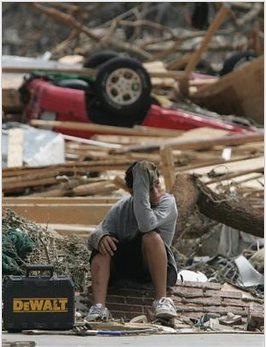
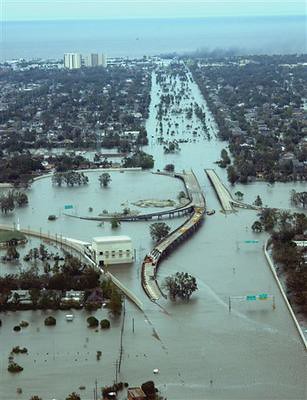

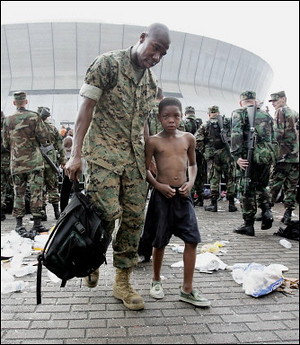


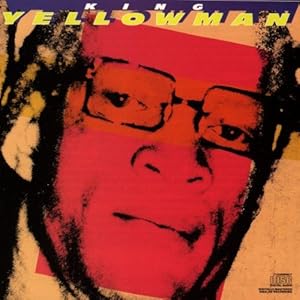 And sure we felt sorry for the folks suffering a local drought in Ethiopia, but our most immediate response was to feel sorry for the confused Brits. We were making our own "Do they know it's summertime" outreach long before the
And sure we felt sorry for the folks suffering a local drought in Ethiopia, but our most immediate response was to feel sorry for the confused Brits. We were making our own "Do they know it's summertime" outreach long before the 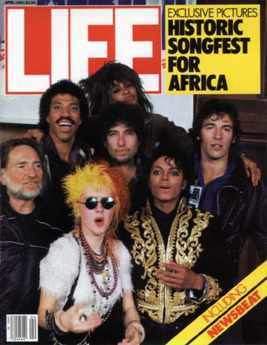 Heeee heee! And then Michael Jackson
Heeee heee! And then Michael Jackson 